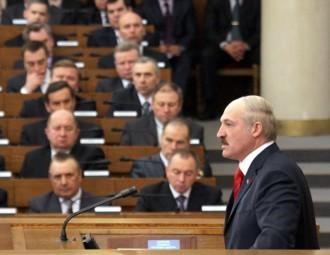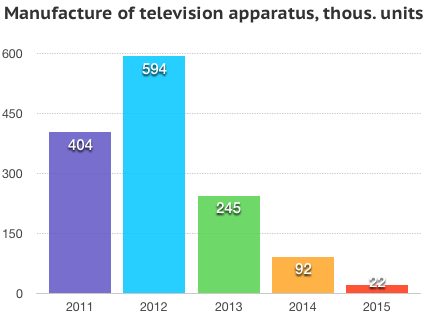Despite the seeming progress, Belarus is just as dysfunctional in terms of public administration
 svaboda.org
svaboda.org
Without reforms, Belarus risks wasting its economic potential and become a country of despair, where low-paid people do not see any future and emigrate. In fact, that process is already underway.
On 29 March, President Aliaksandr Lukashenka held a meeting dedicated to the accession of Belarus to the World Trade Organisation (WTO). Belarus has enjoyed observer status in the organisation since 1993, and every few years proclaims it will speed up the accession process.
However, as Belarus’s economic reforms falter, a final deal remains elusive. The March meeting was intended to expedite accession, but it also served as a solemn reminder that Belarus may never join the WTO at all.
WTO accession is just one of many issues that Belarusian authorities have wrestled with for decades, without any clear outcome.
Certainly, Belarus as a country has made some progress. When visiting Minsk today many foreigners discover that the Belarusian capital is not that different from other Eastern European capitals. One can dine at a good restaurant, visit an art gallery, and call an Uber to return to a comfortable hotel.
The city is suited for a middle-income economy, authoritarianism notwithstanding. Comparisons to increasingly dysfunctional post-Soviet neighbours Russia and Ukraine make Belarus seem like a part of Europe.
And yet when it comes to public administration, Belarus remains in many respects just as dysfunctional. According to the 2014 Indicator of Quality of Governance, public governance in Belarus ranks lower than in Ukraine and only slightly better than in Russia.
Of zombie enterprises and abandoned school reforms
Belarusian authorities have sustained a litany of unprofitable enterprises when it would be more economical to simply halt their activity. For instance, the state budget has financed JSC Kamvol, a loss-making synthetic fibre producer, for more than 15 years, when the cheaper option would be to shut it down and issue a 10-year salary to its employees.
Process often takes precedence over outcome. If a loss-making company continues to operate, officials can continue drawing funds from the budget.
In another example, the state invested over $1 billion into “modernising” cement and woodworking industries, but these businesses continue to generate losses. Recently, a flax factory in the small town of Liakhavichy used public funds to purchase new equipment, only to discover that it did not fit into the factory building.
Many officials refuse to accept the reality that state programmes fail no matter how much public largesse is poured into them. According to Deputy Prime Minister Uladzimir Siamashka, in 2005-2010 alone, Belarus spent $42 billion on the revival of Belarusian villages, with little to show for it. Research by the National Academy of Sciences reveals that more than two-thirds of the rural population do not want their children to live in a village.
In Belarus’s chaotic system of public administration, it is never entirely clear who makes decisions or how those decisions are implemented. For example, in the area of education reform, the number of school years was briefly raised from 11 to 12 years, but within just one generation was reverted to 11 years.
At the beginning of 2015, the Minister of Education recommended that Belarusian history be taught in the Belarusian language because “talking about our own history in another language is wrong.” And yet, his proposal was never implemented, possibly because the idea caused a nervous reaction in the Russian-speaking media.
Who is to blame for dysfunctionality?
During the 2000s, immense Russian energy subsidies helped smooth over Belarus’s structural flaws. That is not the case anymore – last year Belarus’s GDP contracted by 4%, and the slide has continued into 2016. Now it is becoming clear that few steps were taken in relatively good times to lay a foundation for the future.
As Lukashenka’s economic advisor Kiryl Rudy puts it, “there is always some wishful thinking embedded in the economic plans. An unexpected rise in oil prices or a sudden strengthening of the Russian rouble.” Current government programmes that are supposed to deal with the crisis are just iterations of previously ineffectual programmes. And despite the inordinate power concentrated in Lukashenka’s hands, the authorities remain inert even in times of crisis.
Indeed, in the absence of free elections, there are few newcomers to the ruling class and unelected officials can afford to make unrealistic promises. The head of the National Academy of Sciences of Belarus, Uladzimir Husakou, recently suggested that the Belarusian economy will expand by 8-8.5% this year, although the general consensus is that the recession will continue unabated. The poor quality of government elites is a key reason why Belarus in its current state stands little chance of a brighter future.
Where will the current system lead?

Data: Belstat
Due to the government’s paralysis, its response to the recession has been slow and inadequate. There is a widening gap between Minsk, the relatively prosperous capital, and the rest of the country.
Some manufacturing enterprises, such as television monitor production plants, recently disappeared after years of wasted government funding, while many of the industries that remain, such as machine building, are unprofitable.
Trust in the government is also low. According to a recent poll by the Independent Institute of Socio-Economic and Political Studies, only 20.6% of respondents said they prefer to deposit their savings in Belarusian roubles, and a majority said they mistrusted the main state institutions.
Without reform, Belarus risks wasting its economic potential as the young generation grows older. It will become a country of despair, where low-paid people do not see any future and emigrate. In fact, that process is already underway.
Originally published at BelarusDigest
-
03.01
-
07.10
-
22.09
-
17.08
-
12.08
-
30.09








































